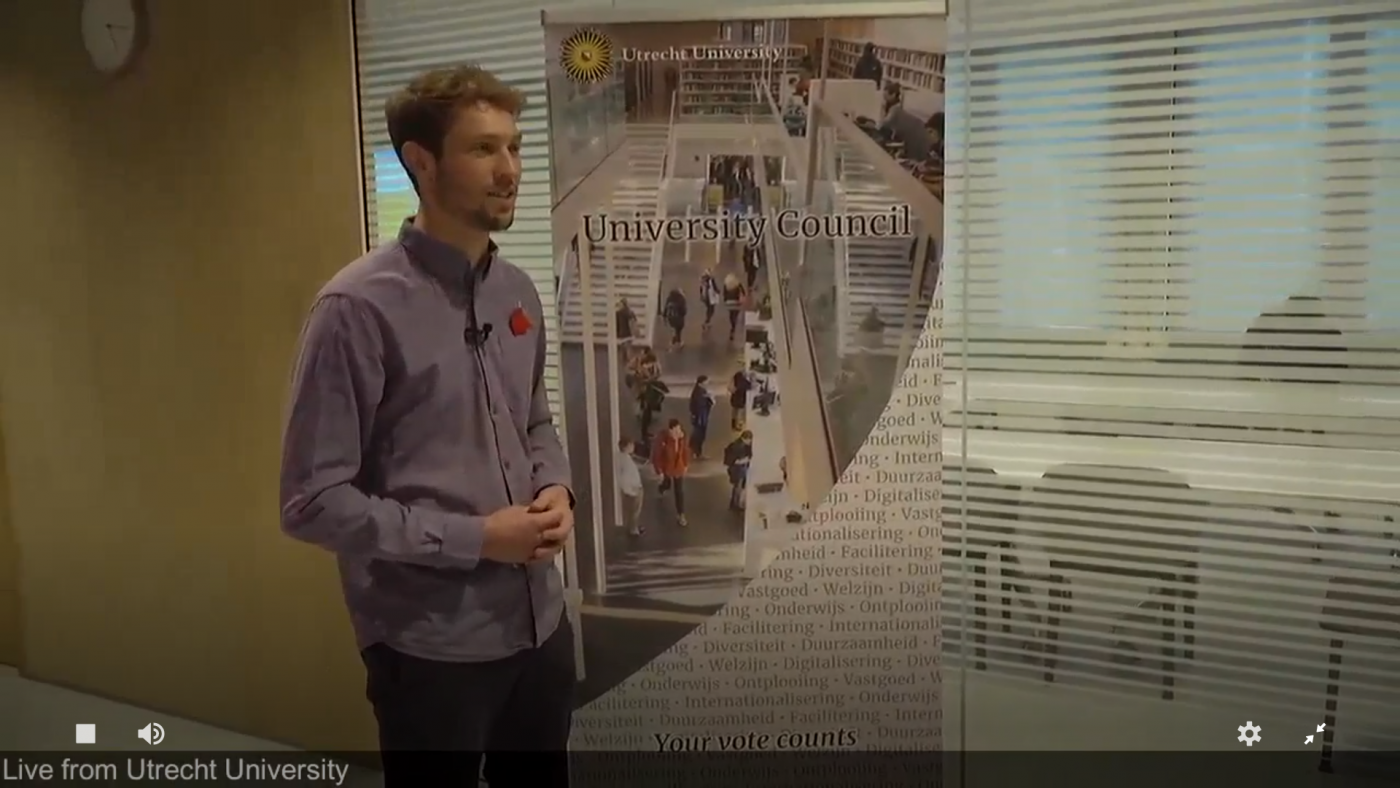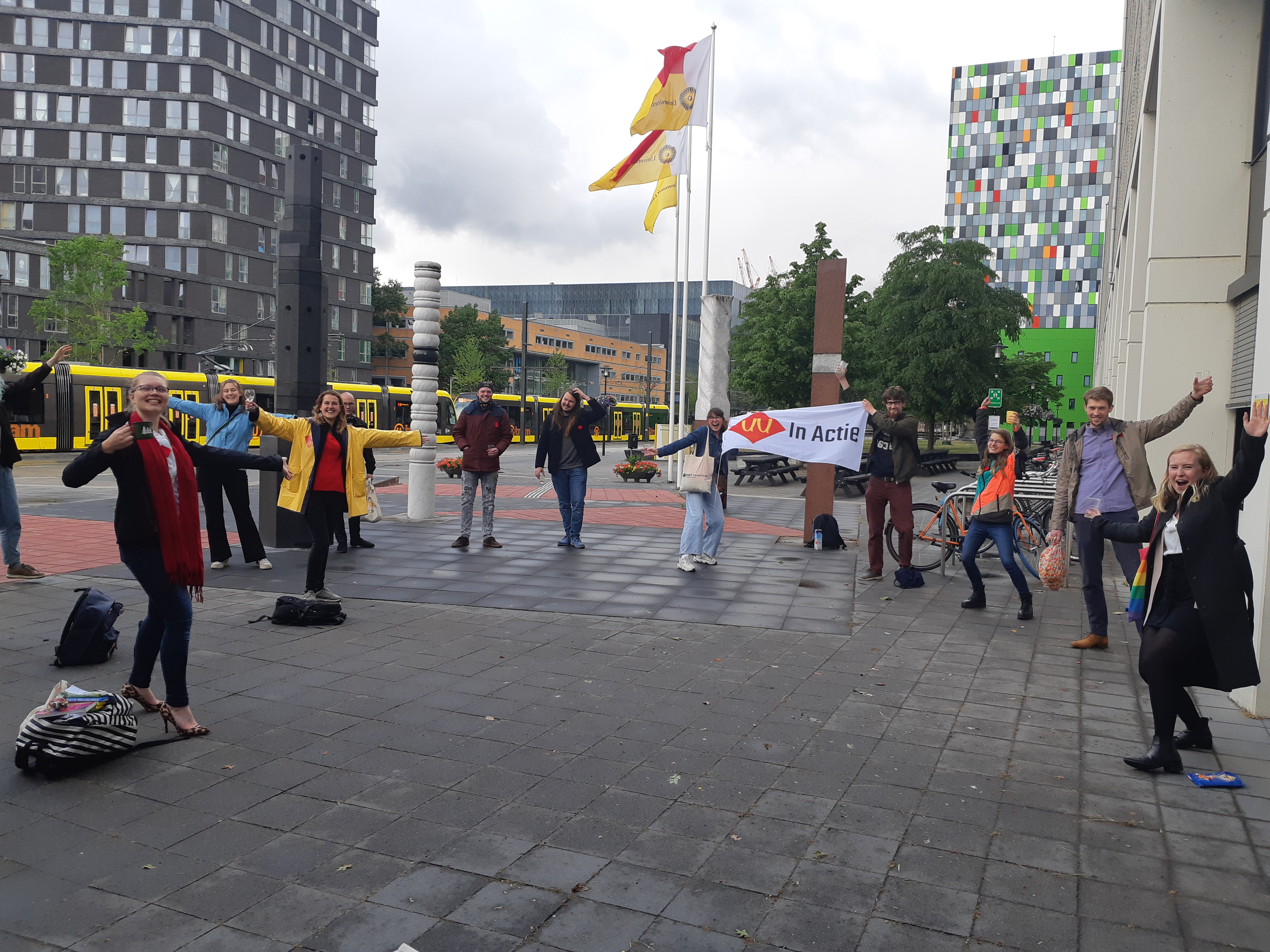UUinActie goes from one to three seats in university council

UUinActie was a new party in the council last year, and is comprised of both students and employees. this year, there were only elections for the student council members, which means the seat distribution for employees remains the same as last year.
The party focuses on better education, better research, and reduced workloads at universities. Students Stephan Verhulst (Law, Economic and Governance), Loes van der Woerdt (Geosciences), and Freek Geerligs (Science) have now earned a seat on next year’s council on behalf of UUinActie.

Lijst VUUR remains the largest party and retains five seats. Roman Monte (Science), Andreia Fernandes Duque (Law, Economic and Governance), Martijn Baars (Humanities), Nandika Mogha (UCU), and Tom Buster (Social Sciences) will take the places in the council for Lijst VUUR.
Losses for PvdUS and de Vrije Student
The Partij voor de Utrechtse Student (pvdus) and de Vrije Student both suffered losses. Both parties have to give up one seat, going to three and one seat(s), respectively. The PvdUS obtained one ‘residual seat’. The other residual seat was given to UUinActie.
For De Vrije Student, Kick Rechsteiner (Law, Economic and Governance) will take a seat in the council; for the PvdUS, the new student council members are Pepijn Lapidaire (Humanities), Romy van Wijk (Law), and Sya Huijskens (Humanities).
Of all the students running for seats, Roman Monte of Lijst VUUR won the highest number of votes: 368. In total, 6,521 students voted in the elections, which amounts to 20.9 percent of the total constituency. That’s three percent less than last year. As a result of the corona crisis, students had to campaign online this year.
“It’s good that the elections still took place,” says University Council president Harmen Binnema. “The turnout is usually between 20 and 25 percent. We can be satisfied with this turnout, in these circumstances.”
Announcement
In other years, the election results were presented in the University Hall. In order to at least let the election results feel like a special occasion, the university opted for a livestream this year. In the Mathias Jorissen chamber, Fred Toppen – as president of the National Election Office – presented the results of the election.
Afterward, all parties had the opportunity to respond to the election results. All parties had been invited to be present in the Administration Building with a maximum of five people. UUinActie was the only party to accept the invitation; the others preferred to watch within a group of their own.
As the seat distribution was announced, loud cheers could be heard from where the UUinActie members were seated. “We felt good about our campaign, but obtaining three seats is more than we’d expected,” said a jubilant Stephan Verhulst in a first response.
For PvdUS and de Vrije Student, the results were bitter. “We’d already lost seats in the past few years. Now we’re going back to three. This next year, we’re going to do everything we can to obtain more seats,” says Pepijn Lapidaire, who watched the results from the campaign leader’s student home. Kick Rechsteiner was also disappointed. “We hadn’t seen this coming. But I’m going to try my best to make sure we obtain two seats again next year.”
Roman Monte of Lijst VUUR was satisfied with the results. “At first, we didn’t think it was a good idea to hold elections in times of corona. But when the decision was made to hold them after all, we flipped the switch and campaigned to the max with the entire team.”
Positions
Lijst VUUR is the biggest party in the University Council. The party presents itself as a progressive party. Its main themes are educational quality, sustainability, and student wellbeing. The party wants to make Christmas holidays completely study-free, and opposes the inappropriate use of Ritalin amongst students.
De Vrije Student puts the student at the centre, and is mainly a proponent of freedom of choice and high-quality education. Removing all meat from the university canteens, then, is a no go for them. They also stand for privacy: they’re the only party that put the opposition to proctoring high on their list of priorities. They also feel that students should be able to resit exams even if they passed the first opportunity, just like the PvdUS.
The PvdUS is rooted in association life, and mainly fights for the interests of students who are active outside of their studies. The party wants more money for student organisations, for instance, and it’s the only party that wants to exclusively allow entry to the university library to UUers. They’re also a fierce proponent of flex studying.
The youngest party, UUinActie, was established as a result of the national protest group WOinActie, and fights for reduced workloads for students and employees. They also stand for better education and research. Of all the parties, UUinActie is the most vocal about sustainability: they welcome windmills on campus, and meat-free canteens are nothing but good. They also oppose the introduction of the ‘with distinction’ label on degrees for students who just barely miss out on graduating cum laude, because this would only add to students’ stress and pressure to perform.
The announcement of the election results took place on Friday afternoon, and could be watched via livestream.